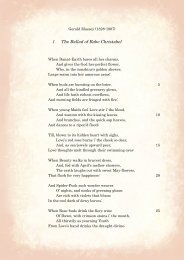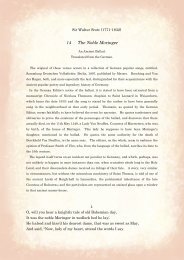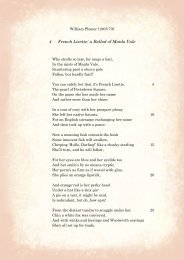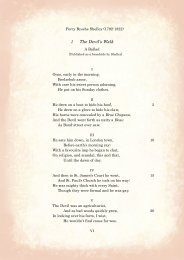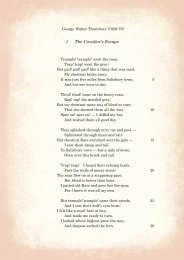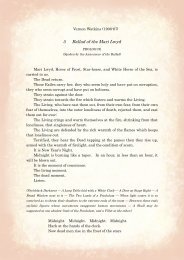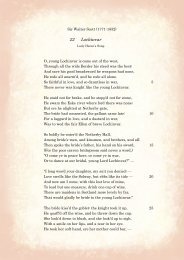1 The High Tide on the Coast of Lincolnshire, 1571
1 The High Tide on the Coast of Lincolnshire, 1571
1 The High Tide on the Coast of Lincolnshire, 1571
You also want an ePaper? Increase the reach of your titles
YUMPU automatically turns print PDFs into web optimized ePapers that Google loves.
Jean Ingelow (1820-97)<br />
1 <str<strong>on</strong>g>The</str<strong>on</strong>g> <str<strong>on</strong>g>High</str<strong>on</strong>g> <str<strong>on</strong>g>Tide</str<strong>on</strong>g> <strong>on</strong> <strong>the</strong> <strong>Coast</strong> <strong>of</strong> <strong>Lincolnshire</strong>, <strong>1571</strong><br />
<str<strong>on</strong>g>The</str<strong>on</strong>g> old mayor climbed <strong>the</strong> belfry tower,<br />
<str<strong>on</strong>g>The</str<strong>on</strong>g> ringers ran by two, by three;<br />
“Pull, if ye never pulled before;<br />
Good ringers, pull your best,” quoth he.<br />
“Play uppe, play uppe, O Bost<strong>on</strong> bells! 5<br />
Ply all your changes, all your swells,<br />
Play uppe, ‘<str<strong>on</strong>g>The</str<strong>on</strong>g> Brides <strong>of</strong> Enderby!’”<br />
Men say it was a stolen tyde —<br />
<str<strong>on</strong>g>The</str<strong>on</strong>g> Lord that sent it, He knows all;<br />
But in myne ears doth still abide 10<br />
<str<strong>on</strong>g>The</str<strong>on</strong>g> message that <strong>the</strong> bells let fall:<br />
And <strong>the</strong>re was naught <strong>of</strong> strange, beside<br />
<str<strong>on</strong>g>The</str<strong>on</strong>g> flights <strong>of</strong> mews and peewits pied,<br />
By milli<strong>on</strong>s crouched <strong>on</strong> <strong>the</strong> old sea-wall.<br />
I sat and spun within <strong>the</strong> doore, 15<br />
My thread brake <strong>of</strong>f, I raised myne eyes!<br />
<str<strong>on</strong>g>The</str<strong>on</strong>g> level sun, like ruddy ore,<br />
Lay sinking in <strong>the</strong> barren skies;<br />
And dark against day’s golden death<br />
She moved where Lindis wandereth — 20<br />
My s<strong>on</strong>ne’s faire wife, Elizabeth.<br />
“Cusha! Cusha! Cusha!” calling,<br />
Ere <strong>the</strong> early dews were falling,<br />
Farre away I heard her s<strong>on</strong>g.<br />
“Cusha! Cusha!” all al<strong>on</strong>g, 25<br />
Where <strong>the</strong> reedy Lindis floweth,<br />
Floweth, floweth,<br />
From <strong>the</strong> meads where melick groweth,<br />
Faintly came her milking-s<strong>on</strong>g.<br />
“Cusha! Cusha! Cusha!” calling, 30<br />
“For <strong>the</strong> dews will so<strong>on</strong> be falling;<br />
Leave your meadow grasses mellow,
Mellow, mellow;<br />
Quit your cowslips, cowslips yellow;<br />
Come uppe, Whitefoot; come uppe, Lightfoot; 35<br />
Quit <strong>the</strong> stalks <strong>of</strong> parsley hollow,<br />
Hollow, hollow;<br />
Come uppe, Jetty, rise and follow,<br />
From <strong>the</strong> clovers lift your head;<br />
Come uppe, Whitefoot; come uppe, Lightfoot; 40<br />
Come uppe, Jetty, rise and follow,<br />
Jetty, to <strong>the</strong> milking-shed.”<br />
If it be l<strong>on</strong>g, aye, l<strong>on</strong>g ago,<br />
When I beginne to think howe l<strong>on</strong>g,<br />
Againe I hear <strong>the</strong> Lindis flow, 45<br />
Swift as an arrowe, sharpe and str<strong>on</strong>g;<br />
And all <strong>the</strong> aire it seemeth mee<br />
Bin full <strong>of</strong> floating bells (sayth shee),<br />
That ring <strong>the</strong> tune <strong>of</strong> Enderby.<br />
Alle fresh <strong>the</strong> level pasture lay, 50<br />
And not a shadowe mote be seene,<br />
Save where full fyve good miles away<br />
<str<strong>on</strong>g>The</str<strong>on</strong>g> steeple towered from out <strong>the</strong> greene;<br />
And lo! <strong>the</strong> great bell farre and wide<br />
Was heard in all <strong>the</strong> country side 55<br />
That Saturday at eventide.<br />
<str<strong>on</strong>g>The</str<strong>on</strong>g> swannerds where <strong>the</strong>ir sedges are<br />
Moved <strong>on</strong> in sunset’s golden breath,<br />
<str<strong>on</strong>g>The</str<strong>on</strong>g> shepherde lads I heard afarre,<br />
And my s<strong>on</strong>ne’s wife Elizabeth; 60<br />
Till floating o’er <strong>the</strong> grassy sea<br />
Came downe that kyndly message free,<br />
“<str<strong>on</strong>g>The</str<strong>on</strong>g> Brides <strong>of</strong> Mavis Enderby.”<br />
<str<strong>on</strong>g>The</str<strong>on</strong>g>n some looked uppe into <strong>the</strong> sky,<br />
And all al<strong>on</strong>g where Lindis flows, 65<br />
To where <strong>the</strong> goodly vessels lie,<br />
And where <strong>the</strong> lordly steeple shows.<br />
<str<strong>on</strong>g>The</str<strong>on</strong>g>y sayde, “And why should this thing be,<br />
What danger lowers by land or sea?<br />
<str<strong>on</strong>g>The</str<strong>on</strong>g>y ring <strong>the</strong> tune <strong>of</strong> Enderby! 70
“For evil news from Mablethorpe,<br />
Of pyrate galleys warping downe;<br />
For shippes ashore bey<strong>on</strong>d <strong>the</strong> Scorpe,<br />
<str<strong>on</strong>g>The</str<strong>on</strong>g>y have not spared to wake <strong>the</strong> towne;<br />
But while <strong>the</strong> west bin red to see, 75<br />
And storms be n<strong>on</strong>e, and pyrates flee,<br />
Why ring ‘<str<strong>on</strong>g>The</str<strong>on</strong>g> Brides <strong>of</strong> Enderby’?”<br />
I looked without, and lo! my s<strong>on</strong>ne<br />
Came riding downe with might and main,<br />
He raised a shout as he drew <strong>on</strong>, 80<br />
Till all <strong>the</strong> welkin rang again,<br />
“Elizabeth! Elizabeth!”<br />
(A sweeter woman ne’er drew breath<br />
Than my s<strong>on</strong>ne’s wife Elizabeth.)<br />
“<str<strong>on</strong>g>The</str<strong>on</strong>g> old sea-wall (he cried) is downe, 85<br />
<str<strong>on</strong>g>The</str<strong>on</strong>g> rising tide comes <strong>on</strong> apace,<br />
And boats adrift in y<strong>on</strong>der towne<br />
Go sailing up <strong>the</strong> market-place.”<br />
He shook as <strong>on</strong>e that looks in death:<br />
“God save you, mo<strong>the</strong>r!” straight he saith; 90<br />
“Where is my wife Elizabeth?”<br />
“Good s<strong>on</strong>ne, where Lindis winds away,<br />
With her two bairns I marked her l<strong>on</strong>g;<br />
And ere y<strong>on</strong> bells beganne to play,<br />
Afar I heard her milking-s<strong>on</strong>g.” 95<br />
He looked across <strong>the</strong> grassy sea,<br />
To right, to left, “Ho, Enderby!”<br />
<str<strong>on</strong>g>The</str<strong>on</strong>g>y rang “<str<strong>on</strong>g>The</str<strong>on</strong>g> Brides <strong>of</strong> Enderby!”<br />
With that he cried and beat his breast;<br />
For lo! al<strong>on</strong>g <strong>the</strong> river’s bed 100<br />
A mighty eygre reared his crest,<br />
And uppe <strong>the</strong> Lindis raging sped.<br />
It swept with thunderous noises loud;<br />
Shaped like a curling, snow-white cloud,<br />
Or like a dem<strong>on</strong> in a shroud. 105<br />
And rearing Lindis backward pressed,
Shook all her trembling bankes amaine;<br />
<str<strong>on</strong>g>The</str<strong>on</strong>g>n madly at <strong>the</strong> eygre’s breast<br />
Flung uppe her weltering walls again.<br />
<str<strong>on</strong>g>The</str<strong>on</strong>g>n bankes came down with ruin and rout — 110<br />
<str<strong>on</strong>g>The</str<strong>on</strong>g>n beaten foam flew round about —<br />
<str<strong>on</strong>g>The</str<strong>on</strong>g>n all <strong>the</strong> mighty floods were out.<br />
So farre, so fast <strong>the</strong> eygre drave,<br />
<str<strong>on</strong>g>The</str<strong>on</strong>g> heart had hardly time to beat<br />
Before a shallow, seething wave 115<br />
Sobbed in <strong>the</strong> grasses at our feet:<br />
<str<strong>on</strong>g>The</str<strong>on</strong>g> feet had hardly time to flee<br />
Before it brake against <strong>the</strong> knee,<br />
And all <strong>the</strong> world was in <strong>the</strong> sea.<br />
Up<strong>on</strong> <strong>the</strong> ro<strong>of</strong>e we sat that night, 120<br />
<str<strong>on</strong>g>The</str<strong>on</strong>g> noise <strong>of</strong> bells went sweeping by;<br />
I marked <strong>the</strong> l<strong>of</strong>ty beac<strong>on</strong> light<br />
Stream from <strong>the</strong> church-tower, red and high —<br />
A lurid mark and dread to see;<br />
And awsome bells <strong>the</strong>y were to mee, 125<br />
That in <strong>the</strong> dark rang “Enderby.”<br />
<str<strong>on</strong>g>The</str<strong>on</strong>g>y rang <strong>the</strong> sailor lads to guide<br />
From ro<strong>of</strong>e to ro<strong>of</strong>e who fearless rowed;<br />
And I — my s<strong>on</strong> was at my side,<br />
And yet <strong>the</strong> ruddy beac<strong>on</strong> glowed: 130<br />
And yet he moaned beneath his breath,<br />
“O come in life, or come in death!<br />
O lost! my love Elizabeth.”<br />
And didst thou visit him no more?<br />
Thou didst, thou didst, my daughter deare! 135<br />
<str<strong>on</strong>g>The</str<strong>on</strong>g> waters laid <strong>the</strong>e at his doore,<br />
Ere yet <strong>the</strong> early dawn was cleare.<br />
Thy pretty bairns in fast embrace,<br />
<str<strong>on</strong>g>The</str<strong>on</strong>g> lifted sun sh<strong>on</strong>e <strong>on</strong> thy face,<br />
Downe drifted to thy dwelling-place. 140<br />
That flow strewed wrecks about <strong>the</strong> grass;<br />
That ebbe swept out <strong>the</strong> flocks to sea;<br />
A fatal ebbe and flow, alas!
To manye more than myne and mee:<br />
But each will mourn his own (shee sayth), 145<br />
And sweeter woman ne’er drew breath<br />
Than my s<strong>on</strong>ne’s wife Elizabeth.<br />
I shall never hear her more<br />
By <strong>the</strong> reedy Lindis shore,<br />
“Cusha! Cusha! Cusha!” calling, 150<br />
Ere <strong>the</strong> early dews be falling;<br />
I shall never hear her s<strong>on</strong>g,<br />
“Cusha! Cusha!” all al<strong>on</strong>g,<br />
Where <strong>the</strong> sunny Lindis floweth,<br />
Floweth, floweth; 155<br />
From <strong>the</strong> meads where melick groweth,<br />
When <strong>the</strong> water, winding down,<br />
Onward floweth to <strong>the</strong> town.<br />
I shall never see her more<br />
Where <strong>the</strong> reeds and rushes quiver, 160<br />
Shiver, quiver;<br />
Stand beside <strong>the</strong> sobbing river,<br />
Sobbing, throbbing in its falling,<br />
To <strong>the</strong> sandy, l<strong>on</strong>esome shore;<br />
I shall never hear her calling, 165<br />
“Leave your meadow grasses mellow,<br />
Mellow, mellow;<br />
Quit your cowslips, cowslips yellow;<br />
Come uppe, Whitefoot; come uppe, Lightfoot;<br />
Quit your pipes <strong>of</strong> parsley hollow, 170<br />
Hollow, hollow:<br />
Come uppe, Lightfoot, rise and follow:<br />
Lightfoot, Whitefoot,<br />
From your clovers lift <strong>the</strong> head;<br />
Come uppe, Jetty, follow, follow, 175<br />
Jetty, to <strong>the</strong> milking-shed.”<br />
1863<br />
(From G. B. Smith, ed. Illustrated British Ballads, Old and<br />
New. Vol. 1. L<strong>on</strong>d<strong>on</strong>, 1881)



